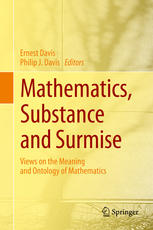

Most ebook files are in PDF format, so you can easily read them using various software such as Foxit Reader or directly on the Google Chrome browser.
Some ebook files are released by publishers in other formats such as .awz, .mobi, .epub, .fb2, etc. You may need to install specific software to read these formats on mobile/PC, such as Calibre.
Please read the tutorial at this link: https://ebookbell.com/faq
We offer FREE conversion to the popular formats you request; however, this may take some time. Therefore, right after payment, please email us, and we will try to provide the service as quickly as possible.
For some exceptional file formats or broken links (if any), please refrain from opening any disputes. Instead, email us first, and we will try to assist within a maximum of 6 hours.
EbookBell Team

5.0
70 reviewsThe seventeen thought-provoking and engaging essays in this collection present readers with a wide range of diverse perspectives on the ontology of mathematics. The essays address such questions as: What kind of things are mathematical objects? What kinds of assertions do mathematical statements make? How do people think and speak about mathematics? How does society use mathematics? How have our answers to these questions changed over the last two millennia, and how might they change again in the future? The authors include mathematicians, philosophers, computer scientists, cognitive psychologists, sociologists, educators and mathematical historians; each brings their own expertise and insights to the discussion.
Contributors to this volume:
Jeremy Avigad
Jody Azzouni
David H. Bailey
David Berlinski
Jonathan M. Borwein
Ernest Davis
Philip J. Davis
Donald Gillies
Jeremy Gray
Jesper Lützen
Ursula Martin
Kay O’Halloran
Alison Pease
Steven Piantadosi
Lance Rips
Micah T. Ross
Nathalie Sinclair
John Stillwell
Hellen Verran